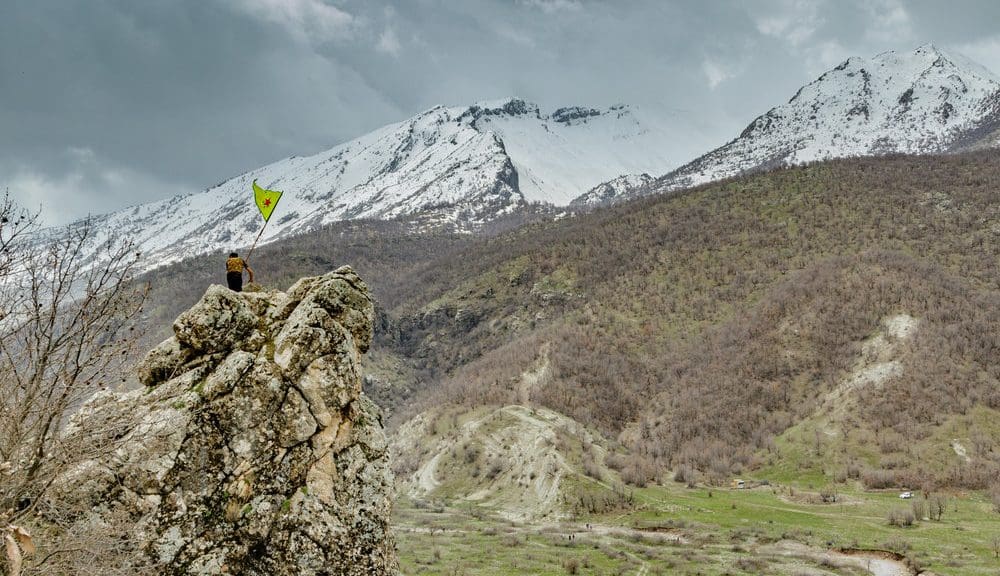Transcribed from the 14 April 2020 episode of This is Hell! Radio (Chicago) and printed with permission. Edited for space and readability. Listen to the whole interview:
We’re in one of those transitional periods where we’re at a crossroads and there’s no turning back.
Chuck Mertz: We were told back in the early 1990s that it was the End of History and nothing would ever change again, with capitalism going unchallenged ad infinitum. Then, history kept happening. Crises kept mounting and tragedies started piling up. Now, the global pandemic is proving yet again that history never ends, and nothing is forever—even capitalism.
Here to help us consider our past, our present, and our future, Remi Debs Bruno and Medway Baker are coauthors of the Cosmonaut Magazine article “The End of the End of History: COVID-19 and twenty-first century fascism.”
Remi is a freelance journalist and copy editor. Welcome to This is Hell!, Remi.
Remi Debs Bruno: Hey there, Chuck, how’s it going?
CM: Good!
And Medway is a writer and editor at Cosmonaut Magazine, also a member of Socialist Action Canada and the New Democratic Party [NDP]’s socialist caucus. Welcome to This is Hell!, Medway.
Medway Baker: Hi, thanks, happy to be here.
CM: Let’s start with you, Medway. Your article starts with a quote by the late economist Milton Friedman saying “Only a crisis, actual or perceived, produces real change. When that crisis occurs, the actions that are taken depend on the ideas that are lying around. That, I believe, is our basic function: to develop alternatives to existing policies, to keep them alive and available until the politically impossible becomes the politically inevitable.”
Medway, what do you think the likelihood is that we will go back to what people are calling ‘normal?’ Will we be acting like nothing happened in, say, eighteen months or two years? Will we be doing exactly what we were doing in 2019? Can we go back to what is called ‘normal?’ What do you think is the likelihood we can do that?
MB: Pretty much zero. This is a crisis on the scale of the great depression. I’m an amateur historian, so I make a lot of parallels from the interwar period to the present era in my head and in my articles. That was a period when there was a massive shift in the entire world system, with the end of World War One, the Russian revolution, total redrawing of the borders in Europe, and then the great depression. Politics was never the same after World War One, and again after World War Two. We’re in one of those transitional periods where we’re at a crossroads and there’s no turning back.
CM: Remi, how do we view history differently when we view some point in the past as ‘normal’—as something we want to return to, a time when we were ‘great,’ and if we simply recreate that, we can make America great again? What happens when we view the future as just replicating history?
RB: Not only does it lead into terrible strategy and bad politics, but it’s a project based on an impossibility. Given historical conjunctures depend for their existence on the conditions at hand and make the world from those. We’re not going to go back. I think about this when it comes to Sanderista politics. I played the part of a Bernie Bro because I thought it served a purpose, but that political project is a callback to a set of economic, geopolitical, and ecological circumstances that just no longer exists and can’t be called back into existence.
For a number of reasons, I don’t think we could resuscitate robust social provision or social democratic reforms. I don’t think that is a possibility, just like I don’t think it is a possibility to return to the circumstances of the pre-World War One era, a world of colonial empires. Those are not among the options available to us right now. The options are vanishingly few: they are being whittled down to socialism or barbarism.
CM: Medway, you both write, “As COVID-19 rages through the shell of a global civilization systematically ravaged by five decades of catabolic capitalism, the facades of processual stability are crumbling and revealing in their place a crossroads for human society. The illusion of stability and robustness projected upon the delicate systems of production, distribution, exchange, and social reproduction has long been predicted to evaporate.”
Is the economy, Medway, collapsing? Is capitalism collapsing because it was all an illusion? And what do you mean by capitalism being an illusion?
MB: Capitalism, especially modern finance capital, really relies on a sort of myth, and it relies on the mentality of There Is No Alternative—that’s the only way the myth persists. That myth is slowly being chipped away—maybe Remi has something more to say about that.
CM: Remi, if enough people believed in the illusion, could capitalism work? If we all have faith, can we have a resurrection of the same capitalism as it existed up until the virus? Can faith, belief in capitalism, overcome the shortcomings of capitalism?
RB: I don’t know that you’d be able to resurrect an economic system functioning exactly as it did before. You simply can’t get back. You certainly can’t get back overnight. All the foundations of capital accumulation that are being crunched up by this crisis and spat out—you’re just not going to get back ten, fifteen, twenty million jobs.
The question of belief—all relatively stable social systems do depend on a shared, collective belief in what we’re doing and the necessity of it. A lot of people refer to this as ideology, or fetishism or alienation—there are all kinds of terms and theoretical constructs that have been built to understand how it is that we all get fooled into thinking that reality at present is “normal” and the way things have to be, and it’s not possible to imagine it being different—because why would you?
Anyway, to answer your question more directly, I don’t believe we’re getting back to the former ‘relative stability’—which was actually, if you recall, horrible and highly unstable.
CM: Medway, you write, “The tasks of socialists, spectating within the structure as it has been stripped down to the girding beams and beyond, are to clear-headedly analyze the conjuncture at which we find ourselves, identify the opportunities and dangers that conjuncture creates, and organize at the weak points which yield the greatest leverage for reusing the rubble that results.”
As I was saying earler, you’re a member of Socialist Action Canada and the NDP’s socialist caucus. What should Bernie Sanders or even Jeremy Corbyn supporters be doing under COVID? What should they be doing with the energy they put into those campaigns now, under COVID?
This is an extremely fragile system, with an overall average rate of profit bumping against zero. It can’t sustain these sorts of shocks, or maintain the kind of society that we could think of as high social-democratic capitalism. It can’t do that for long, and it takes an exogenous shock like this to rip the mask off and crumble the thing down.
MB: The key is to focus not on the electoral arena but to focus on rebuilding a strong workers movement, rebuilding trade unions, rebuilding workers’ civil organizations, so that the working class can construct the embryo of a new society and actually put forward a real alternative to our present capitalist system.
Engaging in the electoral arena does have a limited use, but one of the mistakes that the left has been making for a long time in many countries, not just the United States, is to focus solely on official politics and the electoral arena. That can only really work if we have a strong workers movement that can actually put pressure on the state.
CM: Remi, you write, “The suite of contingencies within which the havoc has arisen and within which it is doing its work have never before existed.”
To what extent were we unprepared not only because of the actions of president Trump or prime minister Johnson, but because of the set of circumstances that have been built up and that makes up our global capitalist society where we’re highly vulnerable to this kind of crisis or disaster? What does it say about capitalism when it does seem vulnerable to this crisis? Can we just blame Johnson and Trump or is there something bigger at work?
RB: It’s meaningless to blame Johnson and Trump or Bezos and Gates, or—pick your target. It’s meaningless. You can do that if you want, I suppose, but it doesn’t accomplish anything and it doesn’t illuminate anything. The thing that’s unique here is not that there’s a pandemic. That’s not historically unprecedented. It’s not that there’s capitalism. It’s not that there’s resource extraction. What is unique about this moment, I would contend, is that for the first time, capitalism has gone global, and the mechanisms and systems that comprise what we refer to and think about as capitalism are really complex, extended, distributed, and diffuse systems, within a larger system, that are actually really delicate. They are highly optimized to capital accumulation and nothing else.
When we have global value chains—and I would recommend folks read a book by John Smith called Imperialism in the Twenty-first Century that talks a lot about this—what we have is an extremely fragile system. What we’re seeing also—and this is not news to anybody who is a Marxist or a leftist—is an overall average rate of profit which is bumping up against zero. It can’t sustain these sorts of shocks, or maintain the kind of society that we could think of as high social-democratic capitalism. It can’t do that for long, and it takes an exogenous shock like this to rip the mask off and crumble the thing down. This is probably the beginning of something like that. We can call high neoliberalism probably as good as dead.
I don’t know what we’ll get out of that. We need to look at what’s going on here, and if we’re going to have any chance at having influence over what results, we need to be really on that, because this is a signal crisis. This presages more to come in this century, because as your guest (and somebody I look up to a lot) Rob Wallace has remarked, the way we produce food and commodities, the way we structure our civilizations, will produce more pathogenic threats; it’s going to produce ecological degradation and all sorts of fun stuff that we really need to be ready for and thinking about in what I think will shape up to be a long twenty-first century.
CM: But Medway, why do we tolerate these continuing crises of capitalism? Is that tolerance sustainable for much longer? We’ve had crisis after crisis over the last twenty, thirty, forty years, and we continue to just keep moving forward and wanting to stay in that ‘normal.’
Why do we tolerate these crises of capitalism, Medway, and is that tolerance sustainable?
MB: The workers movement has been so beaten down over the past several decades. The collapse of the USSR and the Eastern Bloc did herald an end to a historical era in which the workers movement in much of the world was very powerful and there were states covering a massive part of the world that called themselves socialist The early nineties saw a victory for capitalism and a liberal consensus.
Workers all over the world were beaten down and convinced that there is no alternative to capitalism. What we’re seeing now is that, in the Hobbesian sense, there’s a leviathan: a society that we can’t challenge—it’s unchallengeable. But we’re seeing it begin to teeter. The only way out is for a new sovereignty to arise, and that sovereignty is going to have to harness the mass popular sentiment of the people, the masses of working people who are beginning to see that there are cracks in the system and maybe there’s an alternative. But the populist right has been more successful in harnessing popular sentiment for its own political ends—far more successful than the left has been. This is why we need to focus on building the workers movement and constructing a socialist alternative.
CM: Remi, you and Medway also point out that “the increasingly costly machinery of capital production has been either left to rot or cannibalized in favor of an ethereal finance economy. The tools of leverage and speculation are used to direct the operation of the global system as a whole while little of substance is produced in the formerly unrivaled center of commodity production.”
Remi, is COVID revealing that our economy does not produce what we need to survive? And what happens when an economy is created that is not centered on fulfilling humanities basic needs and instead is focused on satisfying financial markets?
Any program of social provision that is helmed by the economic ruling class or their representatives in official politics will not accrue to the benefit of working class power.
RB: I would certainly hope that’s being revealed. One of the opportunities here—it’s a devastating crisis but it also contains within it an opportunity—is that what’s being demonstrated is exactly who performs labor that is productive of value, and who realizes value, versus who moves it around—basically who operates money factories.
I say this in organizing quite a lot: we went from “unskilled labor” to “essential workers” pretty damn quick. That should reveal something that you don’t need to spend five years studying theory and political economy to realize. That presents an opportunity. But I also think it’s worth thinking about that the only way we can respond to something like this or really any of the mounting ecological challenges that we’re going to face as a human species is internationalist.
The only solutions are all internationalist. We can’t address them on a country-by-country basis. We see figures like Donald Trump trying to craft a backroom deal with a German company, or a set of scientists who are working on a vaccine to get exclusive access to it. Guess what, dumbass, that doesn’t do anything. One country has a vaccine? That does nothing for the global economy. It does nothing for human immunity in a broader picture.
These things are all becoming clear to folks. The fact that you can evaporate billions of dollars from the stock market overnight and nothing changes in the real world or in the real economy should probably tell people something. The fact that you can print a trillion dollars a day and say we will print as much money as you need—we’re going to mint two quadrillion dollar coins or whatever—should probably tell folks that money is a form of social control. It’s a representation of social power over other people’s labor.
I’m not trying to get into big bong-ripping stuff about how money’s not real, man—all I’m saying is this probably does lift the veil for a lot of folks, just on a common sense level, about what priorities we want to have. That is something we can have control over if we do the things that create control and power. There’s a huge movement for a mass strike, a campaign of coordinated actions starting on May Day. There have been wildcat strikes in many critical sectors, solidarity strikes with workers striking because they want to be producing ventilators not jet engines. I think this will probably accelerate, particularly once world leaders say, “Okay, crisis is over, get back to work folks!” and the evictions start rolling in and there are no jobs. That’s when we’re going to see the main fallout from this and hopefully when we’re going to see a spike in coordinated action.
CM: But Medway, Remi was mentioning strikes, and I’m just going to play devil’s advocate: do you think strikes are a good strategy at this time when we are under a virus, when we do need things to work, when we do need things like supplies in order to continue surviving? Is there a potential for a general strike to backfire in the faces of the people who do want to start a new and improved workers movement?
MB: I don’t think that strikes are a strategy in themselves, but they’re certainly a very powerful tactic for the left and the workers movement; that’s been proven throughout history time and time again. It’s precisely the ability to turn the economy on and off that does give the workers movement a lot of leverage. That’s a possibility that a lot of people had just forgotten about, and something that we’re seeing a revival of, which is very exciting. We’re seeing workers say, “Hey, wait a minute, you’re saying we’re essential workers, but we have no control over our work conditions, we have no control over what we’re producing? We could just do this ourselves, and we can stop giving you, our boss, our labor to exploit and do it ourselves.”
I don’t think there is going to be some massive revolution coming out of this, but I do think that this crisis is teaching people that ordinary workers do have a lot of power, and even if a strike action happens and flops, it’s going to be important in the reconstitution of a workers movement that one day might be able to actually challenge the capitalist ruling class for power.
CM: Remi, your article was written during the debate over the stimulus package, and at the time the two of you wrote, “There have been at least three calls from prominent figures in or adjacent to the Republican Party for social provisions from the stimulus to those deemed to be ‘real Americans.’ Meanwhile Mitt Romney, the billionaire Mormon ex-presidential candidate and longtime denizen of the lounges of Republican Party officialdom, last week called for a thousand-dollar payment to offset the financial ruin in store for half of US workers in the wake of the indefinite suspension of their employment. Cryptofascist senator Tom Cotton today decried the ersatz and indirect system of tax credits used for social provision, calling instead for a UBI-esque policy.
“While at first glance these programs appear to be much needed and overdue relief for millions of Americans barely clinging to the economic margins, they are very likely the opening shots of a coming salvo of right populist political sentiment, a salvo which will certainly vouchsafe the irrelevancy of any left movement and maybe even violently suppress such a movement for generations.”
Remi, how could UBI and these programs undermine the left for generations?
RB: I get in trouble for sticking to this point, but I do, vehemently. Any program of social provision that is helmed by the economic ruling class or their representatives in official politics will not accrue to the benefit of working class power. To the extent that they even materialize in a meaningful way that can alleviate the suffering and difficulties that working people have, they’ll be controlled by people who are not your friends. These are the same people who literally survive by extracting our time on Earth as living people and our labor.
It’s not just because these people are mean that these programs will be harmful. It’s because they are always operated not as universal social goods but as exclusionary mechanisms to signal who is in and who is out. For the coming political situation and world environmental situation that we’re going to have, we’re going to see more exclusionary mechanisms like this that will lead up to what some people think of as an ecofascist or exterminist way of doing politics and resource distribution.
Additionally, UBI proposals always provide a bare minimum: a starvation wage-replacement. What the effect of that will be, I think inevitably, will be to informalize populations who get this bare social provision and turn them into surplus populations. Let’s face it: in the post-manufacturing era in the imperial core, in the US and in western Europe, when we’re not manufacturing and producing value directly, we have a whole cavalcade of bullshit jobs, and things that don’t need to be done, and things that don’t really produce anything. There’s really no reason essential to the system of production and distribution that we have that a lot of these positions need to exist. So if there’s a program which creates a way to eliminate those and make these forms even “leaner,” more optimized, and efficient, they will go for that, and what we’ll see is what has happened in a lot of the periphery, in the Global South: we’ll have mass ghettoization, people who survive on a pittance in informal economies, and we’ll see the existing provisions of social goods and resources stripped even further. Although there’s not much more that could be taken away, we will see more and more taken away if we get a UBI.
Additionally, it’ll be something that we have to struggle over every two, four, and six years. Just like we have to fight over cuts to social security or the postal service or Medicare and Medicaid, or in the UK they have to fight every year over whether or not the NHS is going to be gutted and privatized. It’ll be another thing like that. It’s a huge boondoggle. We should not come hat-in-hand to the capitalist class and beg for scraps. What we should be focusing on is building the power that we would need to demand our cut, and to run our economy and our lives in a way that we could.
The programs and rhetoric of right-populists does not end up materializing in a way that actually benefits working people. What it does instead is remove our capacity to self-determine. It usually violently represses any attempt to cohere power from below. It ends up restraining the ability of working people to fight for themselves.
CM: Medway, just following up on Remi, you both write about how UBI changes the citizen into more of a shareholder. We’ve had this controversy and discussion here in the States about citizens being seen as consumers first before they’re seen as citizens. Medway, how do you think our relationship with government changes when we become shareholders in the government instead of just citizens?
MB: That’s a very important point. The quote about citizens being shareholders is from C. H. Douglas, who came up with the economic theory of social credit, which was channeled into a right-populist political program. It’s important ro distinguish between social democratic reform and right-populist reform for one crucial reason: the role of class struggle in those reform movements. Of course I don’t see social democracy as revolutionary, and I see myself as a revolutionary—but it is a progress which harnesses class struggle in order to forge a more humane capitalism, whereas right-populist reform is a project which unites workers with the middle class against a vague elite in order to stifle class struggle and destroy any class independence that the working class has.
Turning citizens into shareholders in the state and the economy is a project which is meant to destroy the working class as a class and create a sense that “we’re all in this together,” in order to clamp down on class struggle.
CM: Let me just follow up with you on that, Medway. You write, “The victory of rightwing populism in Alberta, Canada, destroyed the capacity of labor activists and socialists to have any success for generations in uniting the workers and petty bourgeois against the banks and the political establishment. Social credit simultaneously staved off the threat of a genuine workers movement which could pursue its own independent interests.”
Medway, do workers knowingly give up their own interests in support of blaming the banks and political establishment for their suffering? And if so, why is that blame more attractive than pursuing their own interests?
MB: Of course not. These right-populist movements portray themselves as pursuing the interests of the working class, but they destroy the notion of a working class as a class in and for itself. They construct a narrative of the vague “people” against the vague “elites.” It’s a very attractive notion, that all of us people who are suffering down here are all in this together and we can unite to take back what is rightfully ours. But at the end of the day it’s a myth that serves to stifle class struggle.
Of course no one consciously is giving up a movement that fights for their interests. Everyone is always trying to pursue their own interests, I think. What we need to do is expose how these right-populist movements aren’t actually working in the interests of the working class. Even if they do provide benefits for certain sectors of the working class, they undermine the ability of workers to fight for our own interests, and at the end of the day this just serves to perpetuate the capitalist order.
RB: Can I jump in on that? Let’s emphasize that the programs and the rhetoric of right-populists does not end up materializing in a way that actually benefits working people. What it does instead is remove our capacity to self-determine. It usually violently represses any attempt to cohere power from below. It ends up restraining the ability of working people to fight for themselves. These things do not end up benefiting people.
The fundamental equation of what we get in exchange for what we give—our labor and our time on Earth—does not change without a working class movement from below. The fundamental equation does not change. The “what we get” side of that equation will take different forms and maybe be shuffled around here and there, but it doesn’t change.
CM: Let me ask you real quick here, Remi: are the two presidential candidates offering what you believe are two impossibilities? Is that what the public actually wants? Are our choices either the myth of going back to the high profits of the mythical 1990s or, as you describe Biden’s last-ditch resuscitation of the “third way” characteristic of the late 2000s, which you also see as impossible?
If those are our two choices, what does it say about our future, and what does it say about us that that’s all we’re demanding right now?
RB: It says something very hopeful. When the present becomes impossible and intolerable at the same time, then the future starts being thought about again. I would say that what we’re seeing is maybe what Mark Fisher would have liked to see. I don’t think the future is canceled anymore. When the present becomes impossible, rupture becomes inevitable. The question then becomes whether it breaks left or breaks right, not whether it breaks. History has been un-canceled.
CM: I have one last question for each of you. Medway, the political transformation that you would like to see—do you think it’s more likely to happen with Donald Trump as president of the United States or Joe Biden as president of the United States? Would it reinvigorate the left and activists with another Trump term in office, or with Joe Biden in office are there more opportunities for the left to actually pressure and push him in a direction they want to have?
Do you think Trump or Biden is better for a left transformation of the United States?
MB: There’s no good answer to this. They’re both awful alternatives, and I think they’ll both continue to mount an assault against the workers movement as it reemerges. Trump has recently—and throughout his term—mounted a lot of reforms that are aimed at weakening the workers movement and the trade unions, so there is a part of me that says we need to get rid of him to protect the meager rights that still exist for workers. But on the other hand I don’t think Joe Biden would reverse any of those reforms, and I don’t think he would do anything for the workers movement. A victory for the Democratic Party under Joe Biden might create the idea that we can go back to the way things were, we can go back to the Obama era, which would be dangerous for the left.
CM: Remi, this is really an awful question: everybody knows fascism is horrible, it’s awful, and we shouldn’t have it. But can fascism save us from the virus?
RB: God, Chuck. No. I don’t think so. It could stave off some of the worst effects by being an activist state and political project, which is what neoliberalism refuses to be because it’s an ideology that fundamentally believes there eventually shouldn’t be state except for wars and money-printing when the economy goes pear-shaped.
But it is a threat. People are looking for what can help us right now. They’re not going to want to reject the thing that’s on the table in favor of some far-off distant nice future that we could have one day. It is a threat. It cannot help, but it can give the illusion of being able to. It’s not going to come in jackboots and a swastika armband. It’s going to come in a new form and we need to be wary and vigilant about what that looks like.
CM: Thank you both so much for being on the show this morning.
MB: Thanks so much.
RB: I’m such a fanboy of yours. I’m so happy to be on.
Featured image: artwork by Robi Walters





